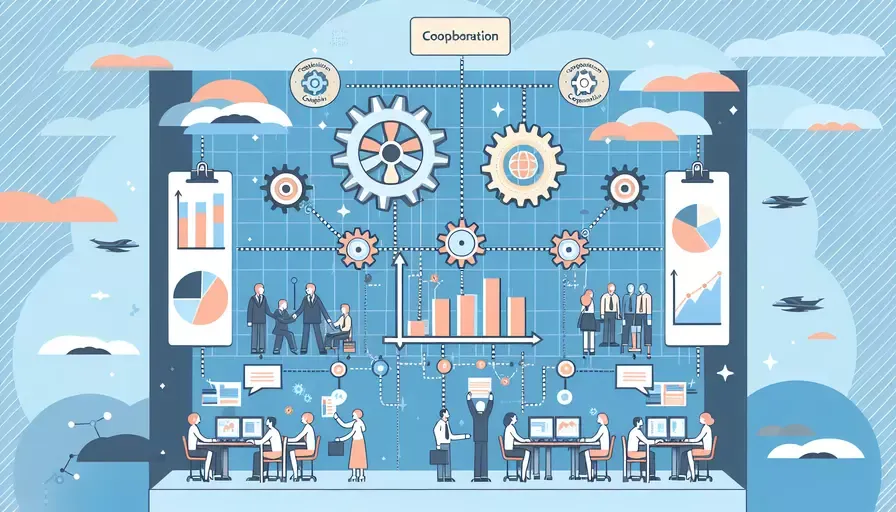Teamwork is a crucial element in the modern work environment, and although the three concepts of collaboration, collaboration and coordination are often confused, they are essentially different. The editor of Downcodes will explain the differences between the three in detail and combine them with actual cases to help you better understand and apply these three team cooperation models, thereby improving team efficiency and work results.

Although synergy, cooperation and coordination are often used interchangeably in daily life, in the actual work environment, there are obvious differences between the three. Collaboration means that team members share resources, jointly pursue a goal, and achieve a common task. Collaboration refers to the interaction between team members to achieve common individual and team goals through mutual efforts. Coordination refers to the process of managing a team to ensure that the work of team members can be carried out effectively to achieve predetermined goals. In short, collaboration focuses more on resource sharing and cooperation goals, collaboration focuses more on the interaction and cooperation process between team members, and coordination focuses more on team management and workflow.
1. The meaning and application of collaboration
Collaboration, as the name suggests, requires multiple parts or people to work together. In a corporate setting, collaboration typically refers to an entire team or organization working together toward a common goal. This usually involves the sharing of resources, such as sharing information, sharing technology, sharing human resources, etc. This can improve work efficiency, avoid duplication of work, and improve the overall capabilities of the team.
For example, the R&D department, production department and sales department of a manufacturing company need to work together and share resources and information to effectively launch new products. The R&D department needs to understand the needs of the market, the sales department needs to understand the characteristics of the product, and the production department needs to understand the production process of the product. These all require collaboration between various departments.
2. The importance and practice of collaboration
Collaboration focuses more on interaction and cooperation among team members. In the process of collaboration, each team member has his or her own role and responsibilities, and needs to work together to achieve the common goals of the individual and the team.
An important characteristic of collaboration is the interdependence between team members. For example, in a software development team, designers need programmers to turn their designs into reality, and programmers need designers to provide design solutions. At the same time, testers need developers to provide testable software, and developers need testers to provide feedback in order to improve the software. This is collaboration.
3. The role and methods of coordination
Coordination is a way of managing a team. Its purpose is to ensure that the team's work can be carried out effectively to achieve predetermined goals. Coordination mainly involves the distribution of work among team members and the control of work progress.
During the coordination process, managers need to ensure that each team member understands their responsibilities, understands how their work fits in with the work of others, and how to work according to the plan. At the same time, managers also need to monitor the team's work progress to ensure that the work can be carried out according to plan.
In summary, although collaboration, collaboration and coordination are all important components of team work, their focus and application methods are different. Understanding their differences can help us better organize and manage the team, thereby improving the team's work efficiency and work results.
1. What is synergy? What is the difference between collaboration and collaboration? Collaboration means that multiple people or teams work together to complete a task or achieve a certain goal by sharing information, knowledge and resources. Collaboration emphasizes cooperation, coordination and interaction among team members, through which work efficiency and quality can be improved. Compared with collaboration, collaboration focuses more on cooperation between individuals or teams. Collaboration pays more attention to the individual working ability of each member and the ability to complete tasks independently.
2. What is the difference between coordination and collaboration? Both coordination and collaboration refer to cooperation between multiple individuals or teams, but there are some differences between the two. Coordination refers to enabling the entire team or organization to achieve a common goal by unifying and adjusting the actions and work among various members. Coordination emphasizes unity and overall effect, requiring a coordinator or leader to coordinate the work among various members. Collaboration, on the other hand, focuses more on cooperation between individuals. Each member has his own tasks and roles and works together to achieve a common goal.
3. What is the relationship between synergy, collaboration and coordination? Synergy, cooperation and coordination are all important concepts in teamwork, and there is a certain relationship between them. Collaboration means that multiple people or teams work together to complete a task or achieve a certain goal by sharing information, knowledge and resources. Collaboration emphasizes cooperation, coordination and interaction among team members. Collaboration focuses more on cooperation between individuals. Each member has his own tasks and roles and works together to achieve common goals. Coordination refers to the unification and adjustment of actions and work among various members so that the entire team or organization can achieve a common goal. Coordination requires a coordinator or leader to coordinate the work of various members and ensure that the work of each member can be coordinated. To sum up, synergy, collaboration and coordination are interrelated and mutually influencing concepts in teamwork, and coordination is achieved through synergy and collaboration.
I hope that the explanation by the editor of Downcodes can help you better understand the differences and connections between collaboration, cooperation and coordination, and apply them flexibly in actual work. Mastering these concepts will effectively improve the efficiency of teamwork and ultimately achieve common goals.